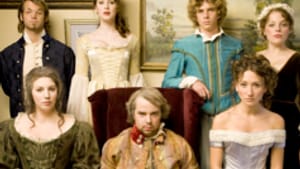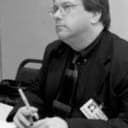Stay in the Loop
BSR publishes on a weekly schedule, with an email newsletter every Wednesday and Thursday morning. There’s no paywall, and subscribing is always free.
A playwright's trial by fire
Theatrical readings, and where to find them

Recently a blazing row developed right here in the letters column of Broad Street Review over the issue of whether audiences and critics who attend play readings can or should be sworn to secrecy about the unfinished works they've observed. As a playwright myself, I readily agree that free speech shouldn't be taken for granted, especially by playwrights and theaters. But the fragile and enthralling process through which plays are developed shouldn't be taken for granted, either.
Like every other artistic work, a play begins within the mind of a single human being. But like a musical score, a play script is merely a partially realized work; a play only truly fully lives when it's produced before an audience, in a collaborative process that incorporates the talents of a director, actors, set designers, stage managers and other gifted folks.
But before all that happens, the playwright must know that the play works: that the characters ring true, the story makes sense, and the dialogue sounds smooth and natural. The way to find out is through a reading, wherein a group of actors sit (or sometimes stand) around a stage, scripts in hand, reading aloud and more or less performing the play for a real audience.
For the playwright, it's simultaneously exhilarating and agonizing: for the first time ever, he or she hears the words and sees the characters live and breathe in the real world instead of the safe and shadowy recesses of the private imagination. It's at that moment that the clunky bits of dialogue, the illogical and unmotivated actions, the inconsistencies of character are stripped bare to cower in the spotlight.
It's an aesthetic gauntlet, a hazing, a trial by fire. And the playwright must sit there and take it, at least until the inevitable post-reading discussion, when he or she is forced to emerge from the comfortable refuge of the last row and join the actors and directors on stage to (horrors!) actually face the audience and attempt to answer for what he's done. The entire point of the exercise is to elicit feedback; whether from seasoned critics or a general audience doesn't matter.
What's in it for the audience?
But what's in it for the audience at such readings? For the curious theatergoer, it's a chance to witness theater in its raw and undiluted form, and to actually participate in the birthing process of a new play. Whether a spectator chooses to participate in the process or not, it's still a fascinating thing to witness: the theatrical equivalent of watching an artist spreading paint on a canvas. It's a laboratory for potential critics, too: If you're a budding John Simon with pungent, penetrating insights and criticism to offer, here's your chance to test them out.
At regular performances, theatergoers are implored to shut off their cell phones, refrain from crinkling their candy wrappers and keep their voices down. Readings offer the audience a chance not only to make some noise, but also to do it in a way that actually influences and helps the creation of a new theatrical work. Sometimes there's even free coffee.
Where to find open readings
You needn't take my word for this. A vital theater center like Philadelphia inevitably offers many opportunities to see play readings. One of the newest and most interesting series in town is the Bridal Salon, launched in February at the Painted Bride Art Center. Every Tuesday evening at 7:30 p.m., coordinator Andrea Myers presents new and evolving plays, performed by a cadre of Philadelphia's most accomplished actors and promising newcomers. All are free and open to the public. (Full Disclosure Dept.: The Salon has presented some of my own work.)
The readings are held not on the Bride's mainstage with its fancy lighting and comfy seats, but in one of the building's rehearsal areas, a rough and unfinished space with concrete floors, exposed girders and folding chairs. The room's no-nonsense functionality helps to emphasize the purpose of the enterprise: It's a practical workshop where plays are honed, shaped, modified and if necessary, repaired. (Next up: Deep Dark Hallow, by Greg Day, April 7.)
Other theater groups regularly hold readings, including the Philadelphia Dramatists Center as well as individual theaters assembling their new seasons. The best information source for everything theater in Philadelphia is the website and mailing list of the Theatre Alliance of Greater Philadelphia.
Like every other artistic work, a play begins within the mind of a single human being. But like a musical score, a play script is merely a partially realized work; a play only truly fully lives when it's produced before an audience, in a collaborative process that incorporates the talents of a director, actors, set designers, stage managers and other gifted folks.
But before all that happens, the playwright must know that the play works: that the characters ring true, the story makes sense, and the dialogue sounds smooth and natural. The way to find out is through a reading, wherein a group of actors sit (or sometimes stand) around a stage, scripts in hand, reading aloud and more or less performing the play for a real audience.
For the playwright, it's simultaneously exhilarating and agonizing: for the first time ever, he or she hears the words and sees the characters live and breathe in the real world instead of the safe and shadowy recesses of the private imagination. It's at that moment that the clunky bits of dialogue, the illogical and unmotivated actions, the inconsistencies of character are stripped bare to cower in the spotlight.
It's an aesthetic gauntlet, a hazing, a trial by fire. And the playwright must sit there and take it, at least until the inevitable post-reading discussion, when he or she is forced to emerge from the comfortable refuge of the last row and join the actors and directors on stage to (horrors!) actually face the audience and attempt to answer for what he's done. The entire point of the exercise is to elicit feedback; whether from seasoned critics or a general audience doesn't matter.
What's in it for the audience?
But what's in it for the audience at such readings? For the curious theatergoer, it's a chance to witness theater in its raw and undiluted form, and to actually participate in the birthing process of a new play. Whether a spectator chooses to participate in the process or not, it's still a fascinating thing to witness: the theatrical equivalent of watching an artist spreading paint on a canvas. It's a laboratory for potential critics, too: If you're a budding John Simon with pungent, penetrating insights and criticism to offer, here's your chance to test them out.
At regular performances, theatergoers are implored to shut off their cell phones, refrain from crinkling their candy wrappers and keep their voices down. Readings offer the audience a chance not only to make some noise, but also to do it in a way that actually influences and helps the creation of a new theatrical work. Sometimes there's even free coffee.
Where to find open readings
You needn't take my word for this. A vital theater center like Philadelphia inevitably offers many opportunities to see play readings. One of the newest and most interesting series in town is the Bridal Salon, launched in February at the Painted Bride Art Center. Every Tuesday evening at 7:30 p.m., coordinator Andrea Myers presents new and evolving plays, performed by a cadre of Philadelphia's most accomplished actors and promising newcomers. All are free and open to the public. (Full Disclosure Dept.: The Salon has presented some of my own work.)
The readings are held not on the Bride's mainstage with its fancy lighting and comfy seats, but in one of the building's rehearsal areas, a rough and unfinished space with concrete floors, exposed girders and folding chairs. The room's no-nonsense functionality helps to emphasize the purpose of the enterprise: It's a practical workshop where plays are honed, shaped, modified and if necessary, repaired. (Next up: Deep Dark Hallow, by Greg Day, April 7.)
Other theater groups regularly hold readings, including the Philadelphia Dramatists Center as well as individual theaters assembling their new seasons. The best information source for everything theater in Philadelphia is the website and mailing list of the Theatre Alliance of Greater Philadelphia.
Sign up for our newsletter
All of the week's new articles, all in one place. Sign up for the free weekly BSR newsletters, and don't miss a conversation.

 Mark Wolverton
Mark Wolverton